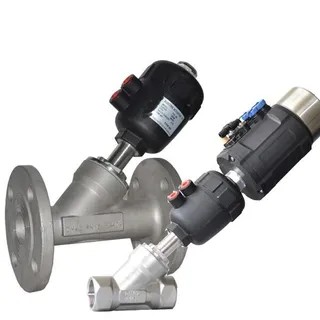
Pneumatic Angle Seat Valves: Versatile and Efficient Fluid Control Solutions
Pneumatic Angle Seat Valves: Versatile and Efficient Fluid Control Solutions
Introduction
We are a leading control valves manufacturer in China, providing high-quality valves and control actuators designed to meet a wide range of industrial applications.
Pneumatic angle seat valves, also known as piston valves, are a distinctive and highly efficient category of valves favored for their versatility, durability, and superior performance. Widely used across industries such as food processing, chemical manufacturing, and water treatment, these valves offer features and reliability that surpass many traditional valve types. This article explores the key advantages, industrial applications, and performance comparisons of pneumatic angle seat valves, highlighting why they are an essential component in modern fluid control systems.
Key Advantages of Pneumatic Angle Seat Valves
High Flow Capacity
One of the most notable features of pneumatic angle seat valves is their ability to accommodate high flow rates while minimizing pressure loss. Their optimized internal design allows fluids to pass smoothly and quickly, making them ideal for processes requiring rapid fluid transfer—such as chemical processing and water treatment systems.
Long Operation Cycles
Equipped with a piston-driven mechanism, pneumatic angle seat valves operate with reduced wear and tear compared to traditional valves. The valve opens when air pressure actuates the piston and remains open until pressure is released. This efficient design contributes to extended operational lifespans and less frequent maintenance cycles.
Compact and Lightweight Construction
These valves are designed to be compact and lightweight, allowing installation in tight spaces and complex systems where bulky valves would be impractical. Despite their small footprint, they provide precise control of flow rates and pressures, making them suitable for intricate industrial processes.
Superior Temperature Compensation
Built to withstand a wide temperature range, pneumatic angle seat valves maintain consistent operation under extreme heat or cold. This resilience makes them ideal for demanding sectors such as energy generation and chemical manufacturing, where temperature fluctuations are common.
Dynamic Sealing Capabilities
Pneumatic angle seat valves offer excellent dynamic sealing performance, ensuring leak-free operation even under high-pressure conditions. Their corrosion-resistant construction helps sustain valve integrity and functionality over time, particularly in harsh or corrosive environments.
Comparison to Traditional Valve Types
Compared to conventional pneumatic valves, pneumatic angle seat valves provide several clear advantages:
Higher Operating Cycles: The piston mechanism endows these valves with superior durability and longer service intervals.
Faster Response Times: Greater operating forces enable rapid opening and closing, essential for precise process control.
Compactness: Smaller size facilitates easier integration into space-constrained installations.
Temperature Resilience: They maintain reliable function across broader temperature ranges than many traditional valves.
Industrial Applications
Pneumatic angle seat valves are versatile and reliable, serving critical roles across diverse industries:
Food and Beverage: Used to regulate steam, control fluid flow in brewing, and enable hygienic automated washdowns. Their sanitary design and heat resistance are vital for food safety and process efficiency.
Chemical and Petrochemical: Their corrosion resistance and precise flow control make them ideal for handling aggressive chemicals and maintaining process accuracy.
Energy Generation: These valves manage steam lines, cooling systems, and other essential functions under high pressure and temperature conditions.
Water and Wastewater Treatment: Their fast shutoff and low leakage support filtration, chemical dosing, and sludge management operations.
Pharmaceutical: Precise flow and pressure control in production lines ensure product consistency and safety.
Conclusion
Pneumatic angle seat valves stand out for their exceptional flow capacity, extended operational life, compact design, and reliable performance across varied temperature conditions. Their advantages over traditional pneumatic valves—such as higher durability, faster actuation, and better temperature tolerance—make them a preferred choice in critical industrial processes.
As industries continue to seek valve solutions that optimize efficiency, reduce downtime, and withstand harsh conditions, pneumatic angle seat valves remain a top selection for engineers and operators worldwide. From precise flow control to rapid shutoff, these valves deliver the performance and versatility essential to meet the evolving demands of today’s industrial landscape.
In essence, pneumatic angle seat valves are more than just valves—they are vital enablers of efficient, reliable, and safe fluid management in a wide array of sectors.Know more about Google SEO Directory
© 2024 Crivva - Business Promotion. All rights reserved.